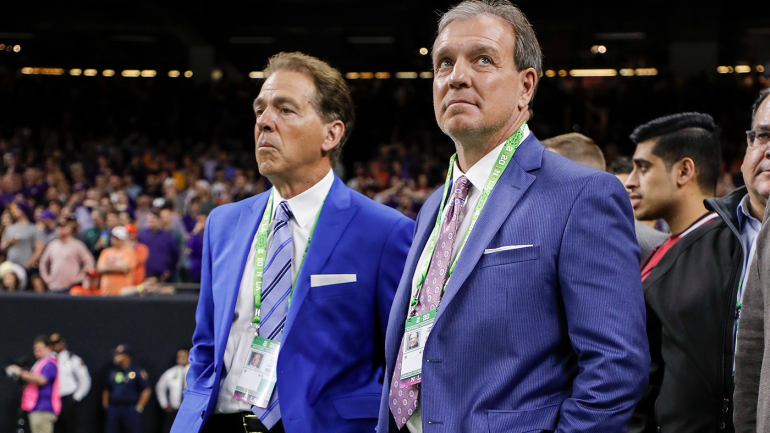
Nick Saban and Jimbo Fisher are feuding. You might have heard … and read and watched. The invective is real, and it is spectacular. Power Five might be redefined as number of fingers the Texas A&M coach has curled up into fist waiting for Saban next week at the SEC spring meetings.
Yes, it's absurd, ridiculous and must-see across all platforms. But in the moment, it has exposed what decades of NCAA investigations, enforcements and penalties could not: a bit of transparency.
Name, image and likeness has allowed the curtain to be pulled back on how the sausage in made. In this case, the sausage is recruiting, which is greasy enough without attaching a breakfast analogy to it.
You can talk smack about a man's record, playcalling or coaching staff quality, but you better not go there with recruiting. Not publicly. And that's what Saban did.
Recruiting is the heartbeat of the sport. Everything about college football eventually comes down to recruiting.
Through the accusations from the Alabama coach -- and really, that's all they are right now -- we've discovered more about the recruiting process than at any time since the SMU death penalty.
Jimbo "bought" his recruiting class? Tell us more. What has been a rumor in the industry Saban exposed as fact. Well, his fact. If true, how is the climate any different than it was previously? Recruits have been bought since the first hundred-dollar handshake.
NIL has blurred the meanings of terms like "pay for play," "inducement" and even "booster."
The NCAA isn't about to tell us. So, we've got two superstar coaches essentially quibbling not about the degree of wrongdoing but whether lining up a recruiting class with all the NIL advantages available is dirty.
Nick says yes. Jimbo fired back, disparaging his former boss in the strongest possible language. Their relationship is over.
Does that stop the sniping? Because as a college football consumer … I want more.
A Power Five coach recently told me all current discussions with recruits begin with how much NIL money they can receive. Is that wrong, or is it just the way of the world right now?
Hugh Freeze must be laughing today. Remember that top-five Ole Miss class that seemed so out of sorts in 2013? The NCAA concluded in 2019 that there was "an unconstrained culture of booster involvement in football recruiting." Louisiana has a bill pending that would allow NIL booster involvement. Tennessee, Missouri and Mississippi either have laws or pending laws that would allow coaches to line up NIL deals.
One man's cheating is another man's recruiting.
I'm reminded of the scene from Casablanca where Louis Renault exclaims, "I'm shocked, shocked that gambling is going on in here."
There's a bit of glass houses aspect to all this. Any coach who has ever "bought a player" or had knowledge of it -- under the old rules -- has to disqualify himself from the discussion.
Is Fisher a renegade or a cutting-edge NIL opportunist?
At the end of the day, we're witnessing a hissing match between coaches who assembled the top two recruiting classes in the 2022 cycle. Absolutes in the recruiting space seem hard to come by when questioning someone's ethics.
At least under the old rules, we knew the rules. Or we at least had an idea. Six figures. New SUV. Money paid to an uncle's church that can never be traced. Handing out cryptocurrency seems to be all the rage, too.
What's different is coaches are under a greater pressures in the NIL era. What used to happen under the table is above it, public and -- until further notice -- largely legal. Sooner or later, those monster NIL deals reflect back on a coach whose fan base asks, "Why can't we do that?"
What's different is NIL revealed a black market economy that is now more or less allowed and above board. At some level, it's legal until someone somewhere can prove offering a Kansas State guard (Miami transfer Nijel Pack) an $800,000 contract to tweet and do videos for a billionaire's business is against the rules.
On its face, it's allowed by both the spirit and letter of what is currently NIL law. If so, all we're arguing about is the number of zeroes attached to a deal.
Add in one millionaire national championship coach questioning the ethics of another millionaire national championship coach, and you've got a slap fight that never would have happened without NIL.
Coaches had plausible deniability. If they swam in those recruiting waters, they weren't going to drown.
It used to be, "I don't want to know how we get the guy, just get him." Now it's, "Why don't we have a collective?"
















